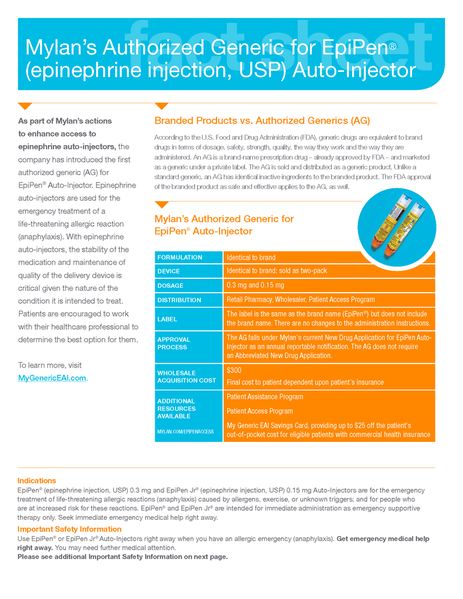Kids With Food Allergies is sharing news from Mylan about the availability of generic epinephrine auto-injectors. Mylan announced earlier this year that it would be releasing a generic alternative to its own branded EpiPen® Auto-Injector to address cost concerns.
Mylan announced Friday it is launching its first authorized generic (AG) for EpiPen Auto-Injector.
The company is releasing details at a new website: MyGenericEAI.com. The website includes a coupon for a $25 savings card for the generic epinephrine auto-injector.
The company expects the generic option to be available in pharmacies next week.
Mylan provided these frequently asked questions:
- Is the authorized generic for EpiPen Auto-Injector the exact same drug in the exact same auto-injector? Are there any differences between the generic and EpiPen Auto-Injector?
According to FDA, the only difference between an authorized generic and a brand name product is the label. They are exactly the same, except the authorized generic does not bear the branded name. A company can create and sell an authorized generic of a branded product it already produces under a previously approved New Drug Application (NDA).
The authorized generic is the same as EpiPen Auto-Injector, including dosage, administration and formulation. The only difference is the label, which does not include the EpiPen brand name.
- What are the anticipated savings for consumers who purchase the authorized generic?
Mylan offers the authorized generic at a wholesale acquisition cost of $300, which is more than 50% lower than EpiPen Auto-Injector. Mylan is taking steps to help ensure that it will be available to consumers at the lowest possible price. The final retail cost to the patient for either the EpiPen Auto-Injector or the authorized generic will be dependent upon their insurance and any mark-ups within the supply chain.
- Is the authorized generic available now? How do I receive the authorized generic?
The product is available in local retail pharmacies. Mylan also offers a Patient Access Program, which provides the authorized generic at $300 per two-pack through a third-party pharmacy network.
Patients should check with their retail pharmacy first to determine authorized generic availability and cost. If the product cost is greater than $300, patients can call 1-844-357-3969 for more information about the Patient Access Program.
- Why would patients pay more for EpiPen Auto-Injector if the generic is the same medicine and device?
Depending on several factors – for example, a patient’s health insurance – the out-of-pocket cost for EpiPen Auto-Injector may be a more affordable option. Mylan continues to offer both options for patients so that they can work with their healthcare professional to determine the best, least expensive option for them. Our goal is to enable everyone who needs EpiPen Auto-Injector to have access to treatment.
- Does Mylan offer a copay program for the authorized generic for EpiPen Auto-Injector?
Yes. Mylan offers a savings card for the authorized generic to eligible patients with commercial health insurance. This provides up to $25 off the consumer’s out-of-pocket cost for each two-pack of the authorized generic, up to three two-packs per prescription.
If you have any further questions, you can contact Mylan's customer service at customer.service@mylan.com.
Indications
Epinephrine Injection, USP Auto-Injectors are for the emergency treatment of life-threatening allergic reactions (anaphylaxis) caused by allergens, exercise, or unknown triggers; and for people who are at increased risk for these reactions. Epinephrine Injection, USP Auto-Injectors are intended for immediate administration as emergency supportive therapy only. Seek immediate emergency medical help right away.
Important Safety Information
Use Epinephrine Injection, USP 0.3 mg or Epinephrine Injection, USP 0.15 mg Auto-Injectors right away when you have an allergic emergency (anaphylaxis). Get emergency medical help right away. You may need further medical attention. Only a healthcare professional should give additional doses of epinephrine if you need more than two injections for a single anaphylactic episode. Epinephrine Injection, USP Auto-Injector should only be injected into the middle of your outer thigh (upper leg), through clothing if necessary. Do not inject into your veins, buttocks, fingers, toes, hands or feet. Hold the leg of young children firmly in place before and during injection to prevent injuries. In case of accidental injection, please seek immediate medical treatment.
Rarely, patients who have used Epinephrine Injection, USP Auto-Injector may develop an infection at the injection site within a few days. Some of these infections can be serious. Call your healthcare professional right away if you have any of the following at an injection site: redness that does not go away, swelling, tenderness, or the area feels warm to the touch.
Tell your healthcare professional about all of your medical conditions, especially if you have asthma, a history of depression, thyroid problems, Parkinson’s disease, diabetes, high blood pressure or heart problems, have any other medical conditions, are pregnant or plan to become pregnant, or are breastfeeding or plan to breastfeed. Be sure to also tell your healthcare professional all the medicines you take, especially medicines for asthma. If you have certain medical conditions, or take certain medicines, your condition may get worse or you may have longer lasting side effects when you use Epinephrine Injection, USP Auto-Injector.
Common side effects include fast, irregular or “pounding” heartbeat, sweating, nausea or vomiting, breathing problems, paleness, dizziness, weakness, shakiness, headache, feelings of over excitement, nervousness or anxiety. These side effects usually go away quickly if you lie down and rest. Tell your healthcare professional if you have any side effect that bothers you or that does not go away.
Please see the full Prescribing Information and Patient Information.
You are encouraged to report negative side effects of prescription drugs to the FDA. Visit fda.gov/medwatch or call 1-800-FDA-1088.
For additional information, please contact us at 800-395-3376.



Comments (0)